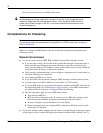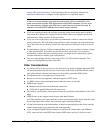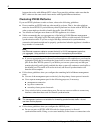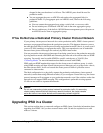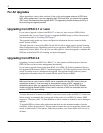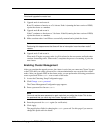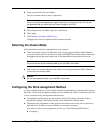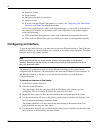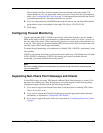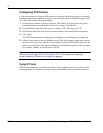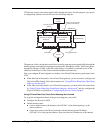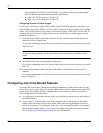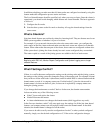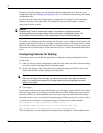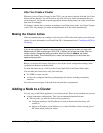
5
222 Nokia Network Voyager for IPSO 4.0 Reference Guide
Sequence Verifier.
Worm Catcher
Delayed notification of connections
Security servers
IP pools (with non-Check Point gateways or clients). See “Supporting Non-Check Point
Gateways and Clients” for related information.
If any of the requirements for static work assignment apply to your cluster, you should use
this setting. For example, you should use static work assignment if your cluster supports
both of the following:
VPNs with Check Point gateways (static work assignment not required by this alone)
VPNs with non-Check Point gateways with IP pools (static work assignment required)
Configuring an Interface
To activate the cluster protocol, you must select at least two Ethernet interfaces. One of the two
must be an internal or external interface (not a primary or secondary cluster interface). The other
interface must be the primary interface.
Note
Nokia recommends that you select another interface as a secondary cluster protocol
interface. Remember that the primary and secondary cluster protocol networks should not
carry any production traffic.
The Interfaces Configuration table lists all the Ethernet interfaces on the system that are
configured with IP addresses. The table displays the status and IP address of each interface. To
add Ethernet interfaces to this list or to activate inactive interfaces, go to the Interface
Configuration page.
To include an interface in the cluster
1. In the Select column, select Yes.
2. Enter the cluster IP address.
The address must be in the same network as the IP address of the interface you are
configuring. This is a common IP address that each node will share.
3. Repeat the above steps for the rest of the interfaces that will participate in the cluster.
4. For the interface that will serve as the primary cluster protocol interface for the node, click
the Yes button in the Primary Interface column.
The primary interfaces of all the cluster nodes must belong to the same network. This
network should not carry any other traffic.
5. For the interface that will serve as the secondary cluster protocol interface for the node, click
the Yes button in the Secondary Interface column.



